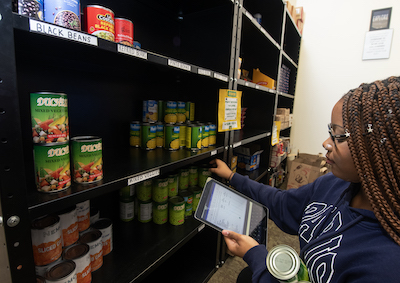George Mason University’s Patriot Pantry, in cooperation with the Capital Area Food Bank, is delivering groceries to food-insecure Mason students and their families.

“We started from a place of understanding that students have a lot of demands being put on their time and on their resources and began with the simple premise that addressing food needs would increase their success rates,” said Sabrina Tadele, director of strategic initiatives at the food bank, a hunger relief organization that works with community partners throughout the Washington, D.C., region.
The food bank delivers shelf-stable groceries and fresh produce to Mason, which, in cooperation with DoorDash, are then delivered to students’ homes within a 15-mile radius of the Fairfax Campus.
“[DoorDash] has been very, very generous with nonprofits, including the whole national network of food banks,” said Tadele.
The Patriot Pantry was the focus of Mason Vision Day 2023, a day of focused philanthropy for the Mason community. Funds raised on Mason Vision Day helped to secure student meal vouchers for on-campus dining, provide gift cards for local grocery stores, and to supply the Patriot Pantry, which is operated by the Student Support and Advocacy Center within University Life.
As part of Mason Vision Day, the food bank matched $30,000 of the funds raised in the form of credits in its online ordering portal, expanding access to a greater variety of foods.
“Food insecurity is often an experience compounded by other forms of basic need insecurity, such as financial instability and unstable transportation,” said Dwayne Hamilton Jr., assistant director for basic needs at Mason’s Student Support and Advocacy Center. “The Home Delivery Program promotes consistent and healthy food intake while addressing financial and transportation barriers that impact access. Confronting these obstacles enables students to devote their full attention to their academics.”
Mason staff fill orders and arrange for food delivery to students. CAFB conducts surveys with students at the beginning and end of each semester to measure the degree of a student’s food insecurity, as well as students’ subjective measures of well-being: physical health, mental health, and ability to focus in class.
Mason will provide academic data with anonymized identifiers, including information on students’ enrollment intensity, time to graduation, and attrition and retention.
“We spent a lot of time with our evaluation specialist designing the surveys the students will receive,” said Tadele. “We have to be able to understand whether [the program] works or not.”
“One of our broader goals with these partnerships is that we want to give students the support they need to finish their programs and then earn living-wage jobs and be able to contribute to our local economy. It’s a cyclical effect,” said Grace Brown, CAFB strategic initiatives manager.
This article originally appeared in University Life's Succeed magazine in a slightly different form.
Related News
- January 29, 2026
- November 10, 2025
- September 29, 2025
- September 18, 2025
- August 6, 2025
